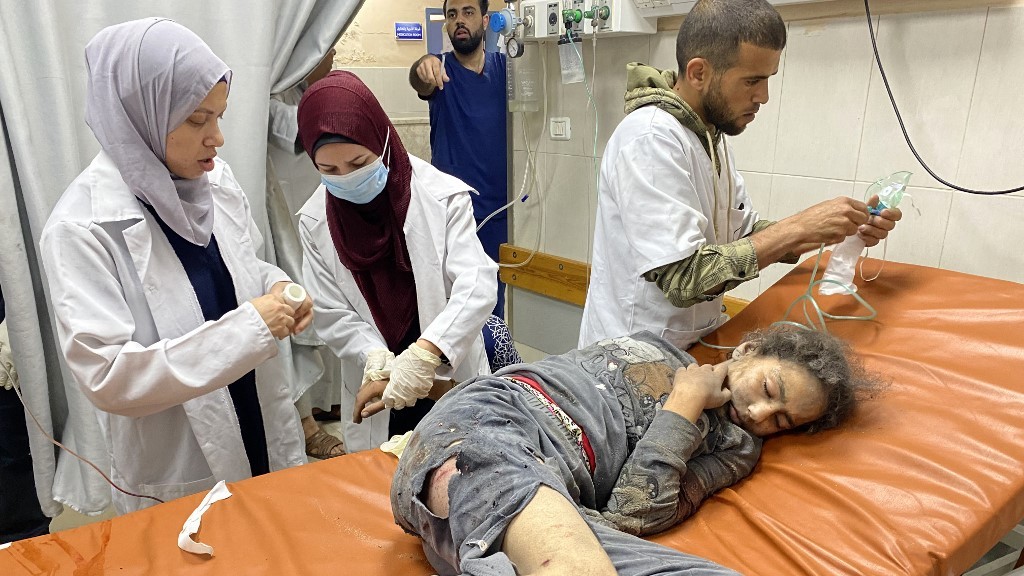Channel 4 will broadcast Gaza: Doctors Under Attack, a documentary laying out damning allegations that Israeli forces systematically targeted Gaza’s hospitals and medical staff throughout their military campaign—allegations which would amount to grave breaches of international law.
“This is a meticulously reported and important film examining evidence which supports allegations of grave breaches of international law by Israeli forces,” said Louisa Compton, Channel 4’s Head of News and Current Affairs. “It exemplifies Channel 4’s commitment to brave and fearless journalism,” she added, announcing the move on Saturday.
Produced by Basement Films and originally commissioned by the BBC—before it was dropped—the film was later reviewed, verified and approved by Channel 4 following rigorous editorial checks.
Gaza: Doctors Under Attack will be shown on Channel 4 at 10pm GMT on Wednesday, 2 July.
The programme offers deeply disturbing footage and testimonies that show Gaza’s doctors and paramedics were not only denied the protections afforded to health officials under international law but were also actively hunted, imprisoned, and even tortured by the Israeli army.
New MEE newsletter: Jerusalem Dispatch
Sign up to get the latest insights and analysis on
Israel-Palestine, alongside Turkey Unpacked and other MEE newsletters
The documentary reveals that every one of Gaza’s 36 main hospitals has now been either damaged or destroyed. Staff have been forced to flee, and patients were reportedly abandoned under gunfire.
“Their hospitals have become combat zones, their very operating theatres conscripted into the military theatre,” Compton said.
‘This documentary presents evidence that Israel’s armed forces have deliberately dragged those offering medical aid into the frontline’
Louisa Compton, Channel 4
In a conflict that has already seen over 200 Palestinian journalists and media workers killed, Basement Films dedicated the film to their Palestinian colleagues on the ground. “We owe everything to them and the medics who trusted us with their stories,” the company said, acknowledging the emotional and logistical toll the film’s production took.
Compton, in a personal piece reflecting on the documentary’s significance, said: “Few situations in the world today have illustrated the duty of journalism more clearly than the 7 October massacres and the months of Israeli assault on Gaza that followed.”
“In [a] video that is terribly hard to watch and with testimony delivered through tears and anguish, this documentary presents evidence that Israel’s armed forces have deliberately dragged those offering medical aid into the frontline,” said Compton.
The documentary, she noted, confronts the reality that both sides accuse each other of weaponising medicine—Israel claims Hamas hides behind hospitals, while Palestinian authorities say Israel deliberately attacked those same facilities.
“The result is harrowing, no doubt. It will make people angry, whichever side they take—or if they take no side,” Compton added. “But we believe there are times when the greater risk is in silence.”
‘No moral or professional reason’
The documentary was ready to broadcast in February but was pulled because of a scandal that erupted over another BBC documentary on children in Gaza, entitled How to Survive a Warzone.
Britain’s public broadcaster said it would broadcast Gaza: Medics Under Fire after the review into the earlier documentary was concluded.
But earlier this month, the BBC announced it would not air the film.
“We have come to the conclusion that broadcasting this material risked creating a perception of partiality that would not meet the high standards that the public rightly expect of the BBC,” the broadcaster said in a statement.
Basement Films, the company which produced the documentary, had previously questioned the BBC’s decision to delay the broadcast, saying, “There is no moral or professional reason why a mistake in one film should repeatedly prevent the release of another film.”
In a statement, Basement Films said: “We would like to thank the Doctors and contributors and survivors, and to apologise for not believing them when they said the BBC would never run a film like this. It turned out they were right.”
The BBC did not explain in its statement why the film would not have met “the high standards that the public rightly expect of the BBC”.
Basement Films said that the BBC “gave us no less than 6 different release dates” after having “told us several times verbally and by email” that the film “had been approved for broadcast”.

